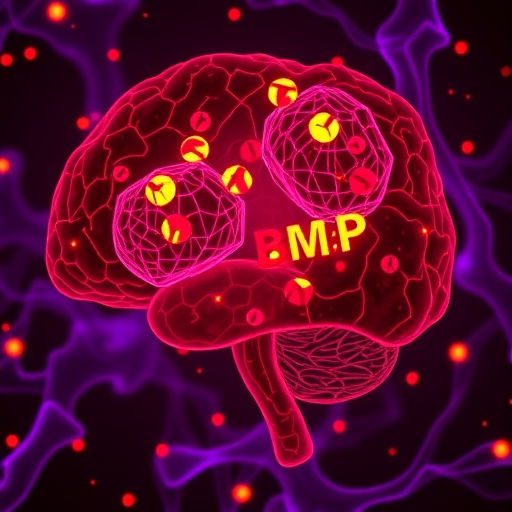Prostate cancer remains one of the most prevalent and challenging malignancies affecting men across the globe. Despite advances in detection and treatment, this disease continues to cause significant morbidity and mortality. Recent research efforts have been focused on unraveling the molecular mechanisms that drive prostate cancer progression with the goal of identifying novel therapeutic targets. A groundbreaking study published in BMC Cancer in 2025 sheds new light on the oncogenic role of the ACTC1 gene and its relationship with the BMP4 pathway, offering promising new avenues for clinical intervention.
This study provides compelling evidence that ACTC1, traditionally recognized for its role in muscle function, is aberrantly upregulated in prostate cancer tissues compared to normal counterparts. By leveraging integrative analyses of large-scale public datasets, complemented by immunohistochemical validation, researchers were able to establish a consistent pattern of ACTC1 overexpression in malignant prostate cells. This discovery challenges previous assumptions about ACTC1’s restricted tissue relevance and pushes it to the forefront of cancer biology research.
Functional assays performed in vitro revealed that the overexpression of ACTC1 significantly enhances aggressive tumor phenotypes, including increased cell proliferation and migration capacity. These malignant behaviors underpin crucial aspects of cancer progression such as tumor expansion and metastatic potential. Conversely, silencing ACTC1 via targeted knockdown approaches yielded a marked suppression of these oncogenic traits, confirming the gene’s direct involvement in promoting tumorigenicity.
Extending these findings into in vivo models, the research team utilized xenograft experiments in immunodeficient mice to mimic human prostate cancer progression more accurately. Tumors expressing elevated levels of ACTC1 demonstrated faster growth kinetics and larger tumor masses compared to controls. This in vivo validation provides a robust confirmation that ACTC1 is not merely a biomarker but an active driver of prostate cancer growth within the physiological context.
To unravel the molecular mechanisms orchestrated by ACTC1, transcriptomic profiling was employed, uncovering a broad spectrum of gene expression alterations linked to immune responses and inflammatory signaling pathways. These immune-related changes underscore a complex tumor microenvironment modulation by ACTC1, potentially creating an ecosystem conducive to cancer cell survival and evasion of immune surveillance.
Among the downstream effectors influenced by ACTC1, Bone Morphogenetic Protein 4 (BMP4) emerged as a critical mediator. BMP4 is well-known for its roles in developmental biology and cell differentiation, yet its function in cancer progression has gained increasing attention. Through pathway analyses, the study identified that ACTC1 upregulates BMP4 expression directly, thereby facilitating malignant phenotypes.
Further functional interrogations demonstrated that enforced overexpression of BMP4 was capable of rescuing the inhibitory effects caused by ACTC1 knockdown. This finding is pivotal because it confirms that BMP4 acts downstream of ACTC1, effectively conveying the oncogenic signals necessary for enhanced proliferation and migration in prostate cancer cells. Consequently, the ACTC1–BMP4 axis appears to constitute a critical molecular cascade driving prostate tumor progression.
These insights carry substantial implications for the development of targeted therapies. Given the centrality of the ACTC1–BMP4 pathway in promoting tumor aggressiveness, therapeutic strategies aimed at interfering with this axis could restrain disease advancement. Small molecule inhibitors, monoclonal antibodies, or gene-editing technologies designed to inhibit ACTC1 expression or BMP4 signaling might emerge as highly effective treatments, especially for advanced or treatment-resistant prostate cancers.
Moreover, the study’s revelation of immune-related changes downstream of ACTC1 hints at the possibility of combining targeted molecular therapies with immunomodulatory approaches. Such combination therapies could leverage both tumor-intrinsic vulnerabilities and the patient’s immune system to achieve more durable and effective clinical responses.
Importantly, the identification of ACTC1 as an oncogenic regulator challenges researchers to reevaluate the functional repertoire of cytoskeletal and contractile proteins in cancer biology. This expands the landscape of molecules considered critical for tumor development and invites further exploration into the non-conventional roles of such proteins in malignancies beyond the prostate.
The clinical applicability of these findings is further strengthened by the study’s use of publicly available datasets and patient-derived tissue analyses, ensuring relevance to human disease. Future clinical studies will be needed to validate ACTC1 and BMP4 as predictive biomarkers for prognosis or therapeutic response, potentially paving the way for personalized treatment strategies in prostate cancer management.
In conclusion, this research presents a comprehensive narrative detailing how ACTC1 acts as a potent oncogene in prostate cancer by upregulating BMP4 expression, thereby orchestrating tumor progression. The establishment of the ACTC1–BMP4 axis as a potential therapeutic target opens exciting new possibilities for combating this pervasive malignancy and improving outcomes for patients worldwide.
As prostate cancer continues to pose significant healthcare challenges, the elucidation of molecular pathways such as ACTC1–BMP4 offers hope for innovative treatments. The fusion of molecular biology, genomics, and immunology as demonstrated in this study exemplifies the multidisciplinary approach necessary to tackle complex diseases such as cancer effectively.
With further research and clinical translation, targeting the ACTC1–BMP4 pathway could become a cornerstone in the fight against prostate cancer, offering renewed hope to patients and clinicians alike. The intersection of basic scientific discovery and therapeutic innovation heralds a new chapter in prostate cancer research, driven by insights such as those brought forth in this landmark study.
Subject of Research: Prostate cancer progression mechanisms and molecular regulation by ACTC1 and BMP4.
Article Title: ACTC1 promotes tumor progression by upregulating BMP4 expression in prostate cancer.
Article References: Zhang, K., Wu, K., Zhao, C. et al. ACTC1 promotes tumor progression by upregulating BMP4 expression in prostate cancer. BMC Cancer (2025). https://doi.org/10.1186/s12885-025-15336-w
Image Credits: Scienmag.com




